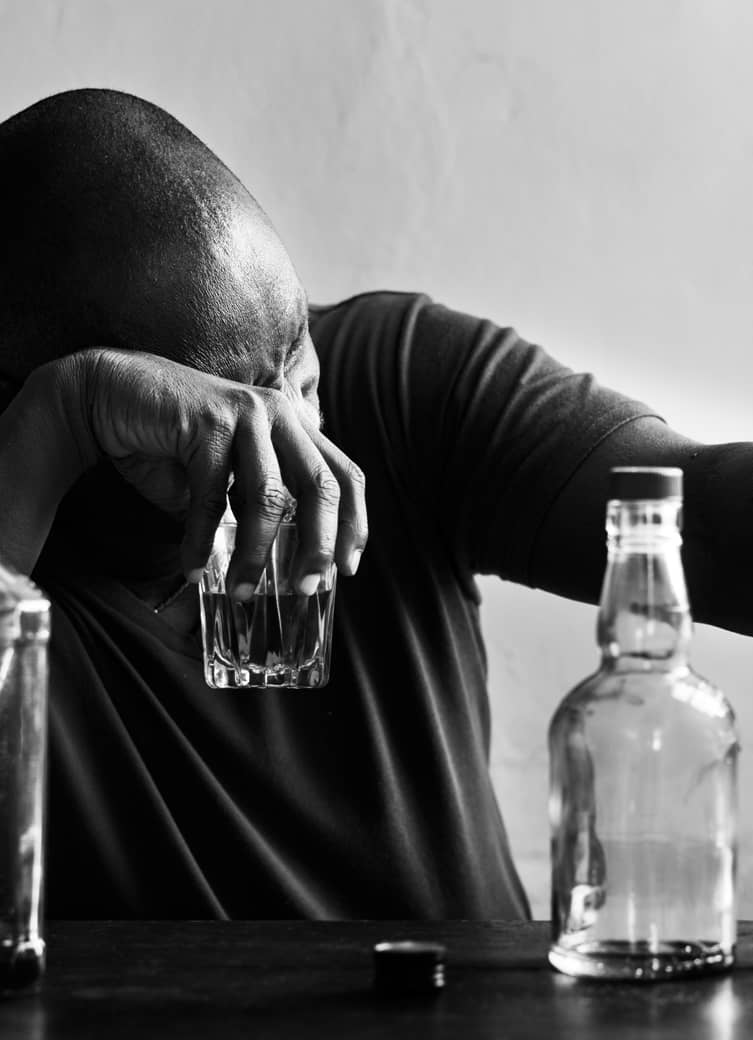What are the first symptoms of alcohol dependence?
The main sign of alcohol dependence is the consumption of large amounts of alcohol, which has a significant impact on the ability to carry out normal daily activities. Alcohol intake can lead to neglect of domestic duties, such as childcare or housework, and absenteeism from work. Addicts may continue to consume alcohol even when it poses a danger to them or others, for example when driving or operating machinery. Sometimes the urge to take alcohol is so strong that the mind finds many ways to rationalise it, even when the consequences are obvious. Physical symptoms of alcohol dependence can include shaking, difficulty walking and sleep disturbances. Severe alcohol dependence is associated with a higher rate of suicidal thoughts and attempts.
What are the phases of the course of chronic alcoholism?
In the first phase, mental dependence, an increase in alcohol consumption, loss of memories of certain events, neglect of daily activities are observed.
In the second phase, physical dependence appears, a high tolerance to alcohol is observed. The addict's personality changes- temper, cruelty, tendency to lie, selfishness.
In the third phase, tolerance to alcohol decreases and personality change deepens. Serious health problems related to alcohol intake appear-gastritis and gastric and duodenal ulcers, liver cirrhosis, hand tremors, polyneuropathy, etc.
Alcohol dependence is a combination of bodily, behavioural and thought disorders. Alcohol use takes on a much higher priority for the alcoholic than their daily activities, work, family and friends.
What are the causes of developing alcohol dependence?
Alcohol dependence has been shown in a number of studies to be more common in people whose parents are also alcoholics. A predisposing factor for this is genetically increased activity of the enzyme alcohol dehydrogenase, which is responsible for breaking down alcohol in the body. Thus, people who are genetically burdened and have an increased tolerance to taking alcoholic beverages have an increased risk of developing dependence.
Purely psychological factors related to the emotional state of the individual are also relevant. Alcohol intake can be associated with feelings of inferiority, anxiety, depression, stress and tension, emotional instability. Most people with psychiatric disorders and psychological problems are also prone to alcohol abuse, and in these cases the onset of abuse is associated with its 'calming' properties.
Which part of the population is most at risk of developing alcohol dependence?
Of all people who use alcohol, about 5 % become dependent. The ratio between men and women is approximately 5 to 1. Most alcohol abusers are in the 25 to 35 age group, and addicts are mostly in the 35-45 age group.
What is the treatment that "Medical Karaj" offers?
The treatment offered by ZIC "Medical Karaj" is conducted in an international clinic for addiction treatment. There the latest techniques and innovations are used to treat all types of addiction. Their treatment methods are the result of scientific cooperation and exchange of experience with the leading hospitals in the world. They use a combination of different detoxification regimens and continuously updated rehabilitation techniques. The clinic has modern medical equipment and highly effective pharmacological therapies. The team is composed mainly of psychotherapists, with whom individual and group treatments are conducted, aimed at treating all mental health problems resulting from addiction.
What are the steps to treating alcohol dependence?
Alcohol dependence treatment has a complex approach. It combines medication, psychotherapy and social rehabilitation.
- The first step to treatment is that the patient is willing to be treated. Addiction could not be treated if the patient did not accept that there was a problem.
- The second step is detoxification- it is cleansing the body of accumulated toxins. The main effect of detoxification is the elimination of withdrawal syndrome. It can last 4-7 days.
- The third step is an assessment of the patient's condition- what damage the addiction has done to the addict's body and mental state.
- The fourth step is medication treatment. Drugs will not cure alcoholism,but cause reactions to its use- nausea, vomiting, headaches.
- The fifth step is psychological treatment and support. The addict's family and loved ones can provide tremendous support for recovery. Also self-help groups, where people with similar problems come together who can help each other to get through difficult times together.
How does the consultation of a patient addicted to alcohol in "Medical Karaj" proceed?
To make a consultation we need more information about the patient- three names,age. How long has he been using alcohol? What kind of alcohol does he take and how much per day? What is his behaviour under the influence of alcohol? Are there physical manifestations from alcohol use? We then do a consultation with the specialists in the clinic and provide financial information about the proposed treatment and its duration. If patients wish, an online consultation with the specialists can be arranged. It is also possible to visit the clinic if the patient and their relatives would like to learn about the conditions there. The patient enters the clinic alone, no companions are allowed. After the end of the treatment, the patient is entitled to free follow-up examinations and consultations for one year- monitoring of his condition is very important.
What is the success rate of the treatment?
The road to recovery from addiction is long and difficult. A large percentage of those in treatment are able to quit drinking for more than 10 years. However, when alcoholic beverages are taken, even after such a long period of abstinence, they again lose control of the amounts they take and return to dependence. Addiction is a disease and as with all progressive diseases, the earlier treatment is started, the better the prognosis!



